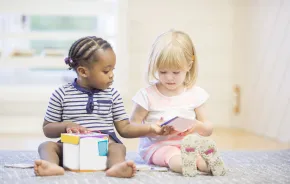They’re barely out of diapers, and already they’re cruising the information superhighway.
Lynnwood mom and recruiter Patty Springberg and husband Erik’s 4-year-old daughter and 3-year-old son love NickJr.com and PBSkids.org. “My kids are at home during the day,” says Patty, “and they spend probably on average an hour per day on the computer.” She says that in addition to having fun, her kids are learning while they play online. “My son is starting to recognize letters more and more, and I think some of that comes from computer play.”
Learning while playing online is the goal of many educational Web sites geared to children younger than the age of 5, including the PBSkids.org sites. Sara DeWitt is the senior director of PBS Kids and Parents interactive. She says all the PBS sites, like PBS shows for young children, come with curriculum goals. The sites that were designed specifically for children under the age of five accommodate their special needs with navigation that includes visual cues for kids who can’t yet read. Young children, she says, love the immediate “cause and effect” experience of clicking on an object and having something happen. And the sites’ programming can often allow the games to adjust to the child’s skill level.
Many children go online for the first time at their local library. Shannon Peterson is the youth services librarian for the Port Orchard branch of the Kitsap Regional Library. “Look at Internet time as an active learning moment, never a babysitting opportunity,” she says. “Internet time should never take the place of normal daily activities, one-on-one time, playing, or family time. I would say that at this age (3-5) and attention span, 15 minutes to a half an hour maximum is plenty.”
Old enough for online?
Not all experts agree that 3- to 5-year-olds should be online. Gloria DeGaetano is the CEO and founder of the Parent Coaching Institute in Bellevue. She believes that parents feel a lot of pressure to get their children online at a very young age, but she says that in reality “the brain of a young child is not equipped to handle screens like adults.” Parents should ask themselves, “What is the best educational opportunity for my child right now?” DeGaetano says. Instead of hours of TV and computer games, she believes that 3- to 5-year-olds should be engaged in activities that require a child to create and move.
Katharine E. Heintz, Ph.D., is a media analyst, researcher, and consultant specializing in the impact of electronic media on children and families. “Right now there is no solid evidence showing that time online is good or bad for kids,” she says. “There are so few controlled studies that generalizing is difficult. That said, I would give parents the same advice I give about any screen medium: Make sure the content is age appropriate, that it fits with your family’s values, and that you limit your child’s time with the medium.” The American Academy of Pediatrics recommends no screen time for children younger than two and no more than two hours per day for children older than two. This includes all screens: TV, computers, video games, and DVDs.
Find appropriate content
“Parents need to pay attention to the age-appropriateness of the content,” says Heintz. “Just because it’s PBS or NickJr does not mean it’s appropriate for all children. If your child is going to be interacting with the computer, it is a good idea to make sure that the content is appropriate and provides the right amount of challenge.”
Heintz says parents need to realize that it’s possible for kids to accidentally leave ‘safe’ sites while online and encounter inappropriate content. Parents need to monitor their children closely, and may want to take some precautions to protect their kids against stumbling into unsavory ‘neighborhoods’ online. “There are lots of different options for parents to filter and block certain content, and there are ways of putting ‘boundaries’ around kids’ movements online,” she says. “I think those are a good idea if preschoolers are going to be online alone.”
The most popular software available for protecting young children online is Net Nanny (www.netnanny.com). But only a third of households with Internet access use filtering or blocking software, according to the Center for Missing and
Exploited Children.
Gloria DeGaetano urges parents not to leave preschoolers alone when they’re playing online. Even better, she says, choose another activity that will help your children learn about connecting with others. “When children are online and watching TV, interacting with screen machines,” DeGaetano says, “those machines cannot provide authentic relationships.”
Kathleen F. Miller is a Sammamish-based freelance writer and mother of two.
Resources
Web sites:
Great Web Sites for Kids was created by librarians from all over the country and has links to recommended Web sites for young children:
PBS Kids sites, including Dragon Tales, Curious George, Clifford the Big Red Dog and It’s a Big Big World, are available at www.pbskids.org.
Nickelodeon’s NickJr site offers entertainment and educational activities for the preschool crowd based on shows such as “Dora the Explorer,” “Go, Diego, Go,” “Blue’s Clues,” “Wonder Pets!” and “LazyTown.” www.nickjr.com
The World of Victor (www.theworldofvictor.com) is a charming Web site for toddlers.
Filtering software:
Net Nanny: www.netnanny.com
Child-safe search engines:
Yahooligans
Education World
Ask Jeeves for Kids
Kids Click
Google users: Go to the Google “preferences” screen and click on “strict filtering.”
Books:
Parenting Well in a Media Age, by Gloria DeGaetano
Failure to Connect: How Computers Affect Our Children’s Minds — and What We Can Do About It, by Jane M. Healy
Bellevue-based Parenting Coaching Institute offers parents the support of coaches trained in helping families make good choices in managing screen time with children of all ages. www.parentcoachinginstitute.com











